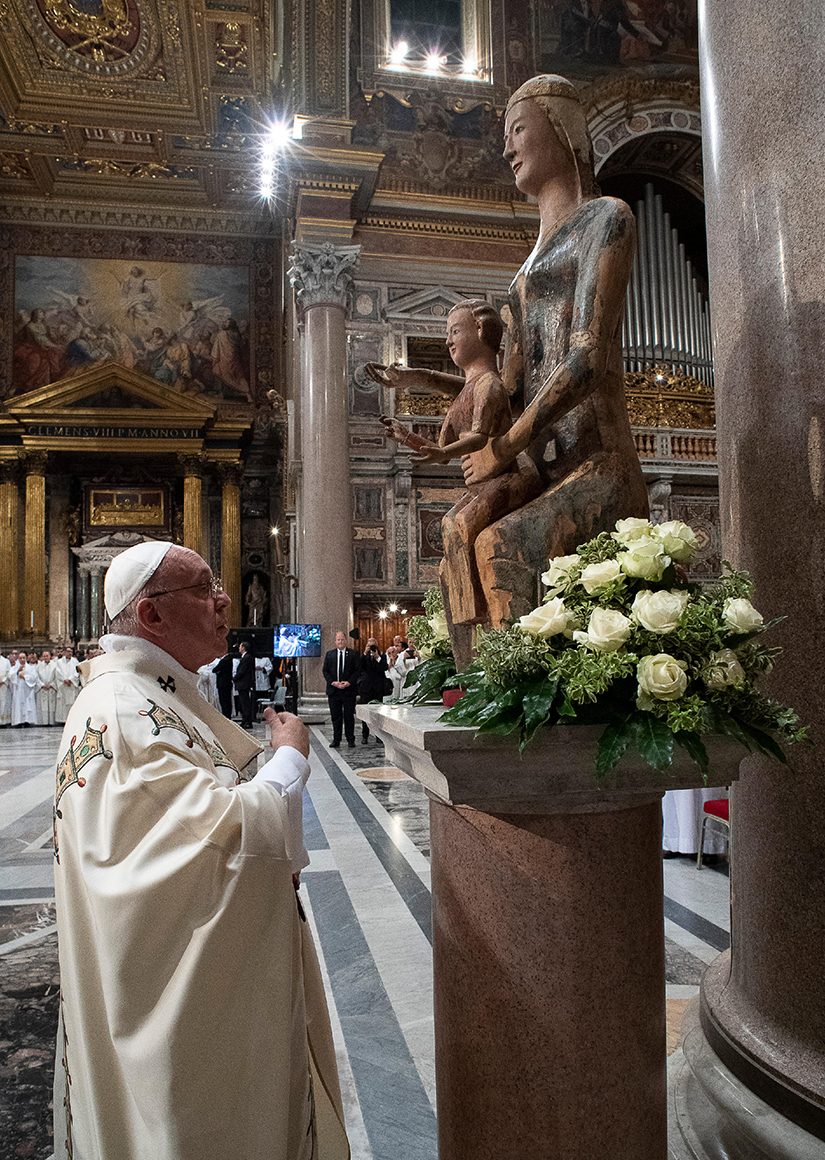 Pope Francis venerated a Marian statue while celebrating Mass at the Basilica of St. John Lateran in Rome Nov. 11. The Mass marked the feast of the dedication of the basilica. “No one, no matter how wounded by evil, is condemned on this earth to be separated from God forever,” the pope said in the homily. “In a way that is often mysterious, but always real, the Lord opens new cracks, desires for truth, goodness and beauty that make space for evangelization.”Photo Credits: Vatican Media
Pope Francis venerated a Marian statue while celebrating Mass at the Basilica of St. John Lateran in Rome Nov. 11. The Mass marked the feast of the dedication of the basilica. “No one, no matter how wounded by evil, is condemned on this earth to be separated from God forever,” the pope said in the homily. “In a way that is often mysterious, but always real, the Lord opens new cracks, desires for truth, goodness and beauty that make space for evangelization.”Photo Credits: Vatican MediaDear brothers and sisters, good morning!
Let us continue our “journey” with the Book of the Acts of the Apostles. After the trials experienced in Philippi, Thessalonica and Berea, Paul arrived in Athens, the very heart of Greece (Acts 17:15). This city that lived in the shadow of its ancient glory and despite its political decline, still held the primacy of culture. Here the apostle’s “spirit was provoked within him as he saw that the city was full of idols” (Acts 17:16). However, rather than avoid this “collision” with paganism it spurs him to create a bridge to converse with that culture.
Paul chooses to acquaint himself with the city and he thus began to visit its most important sites and people. He goes to the synagogue, the symbol of the life of the faith; he goes to the square, the symbol of city life; and he goes to the Areopagus, the symbol of political and cultural life. He meets Jews, philosophers, Epicureans, Stoics and many others. He meets all the people. He does not withdraw. He goes to speak to all the people. In this way, Paul observes the culture and he observes the environment of Athens “with a contemplative gaze” that discovers “God dwelling in their homes, in their streets and squares” (Evangelii Gaudium, 71). Paul does not look at the city of Athens and the pagan world with hostility, but rather with the eyes of faith. And this makes us question ourselves about the way we look at our cities: Do we observe them with indifference? With disdain? Or with a faith that recognizes God’s children in the midst of anonymous crowds?
Paul chooses the gaze that spurs him to create an opening between the Gospel and the pagan world. In the heart of one of the most celebrated institutions in the ancient world, the Areopagus, he achieves an extraordinary example of inculturation of the message of faith: He proclaims Jesus Christ to the idol worshippers, and he does not do so by attacking them, but by making himself “a pope, a builder of bridges” (Homily at Sanctae Marthae, May 8, 2013).
Paul is inspired by the altar of the city dedicated to “an unknown god” (Acts 17:23) — there was an altar with the inscription “to an unknown god,” no image, nothing, only that inscription. Starting from their “worship” of an unknown god, so as to empathize with his listeners, he proclaims that God “dwells among them” (Evangelii Gaudium, 71) and “does not hide Himself from those who seek Him with a sincere heart, even though they do so tentatively.” It is precisely this presence that Paul tries to unveil: “What therefore you worship as unknown, this I proclaim to you” (Acts 17:23).
In order to reveal the identity of the god that the Athenians adore, the apostle begins from Creation, that is from biblical faith in the God of revelation, in order to reach salvation and judgement, that is, the true Christian message. He shows the disproportion between the greatness of the Creator and the temples built by man, and explains that the Creator always makes Himself sought, in such a way that each one can find Him. In this way, according to a beautiful expression Pope Benedict XVI used, Paul “is proclaiming Him whom men do not know and yet do know — the unknown-known” (Benedict XVI, Meeting with representatives from the world of culture at the Collège des Bernardins, Paris, Sept. 12, 2008). He then invites everyone to go beyond the “times of ignorance” and to choose conversion in view of the imminent judgment. Paul thus arrives at kerygma and alludes to Christ without naming Him, defining Him as the “man whom He has appointed, and of this He has given assurance to all men by raising Him from the dead” (Acts 17:31).
And herein lies the problem. Paul’s word, which had kept the speakers in suspense — because it was an interesting discovery — meets a stumbling block: the death and Resurrection of Christ appears to be “folly”
(1 Corinthians 1:23) and raises scorn and derision. Paul then distances himself: his attempt appears to have failed; instead some accept his word and open themselves to the faith. Among them is a man, Dionysius, a member of the Areopagus, and a woman, Damaris. The Gospel takes root even in Athens, and can then proceed with two voices: that of men and that of women!
Today, let us ask the Holy Spirit to teach us to build bridges through culture, with those who do not believe and those who have a different belief from ours. Always building bridges, always with outstretched hand, no aggression. Let us ask Him for the ability to inculturate the message of faith with sensitivity, to have a contemplative gaze toward those who do not know Christ, to be moved by love that warms even the hardest of hearts.
— Pope Francis